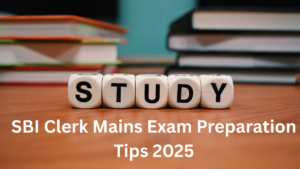Table of Contents
If you have a dream of getting selected as a clerk, assistant manager, or any other prestigious post in a bank, then now is the time to start preparing. 2025 is bringing new opportunities for you, and candidates who had tried earlier but could not succeed can make their dream come true this time by preparing with full hard work and dedication. Today we will tell you “How to start preparing for the bank exam in 2025?” and will explain this process step-by-step. This guide will help you move in the right direction and reach your destination.
How to Start Preparing for the Bank Exam in 2025?
Bank exams, such as IBPS PO, SBI PO, IBPS Clerk, and others, are highly competitive and many banks release vacancies from time to time. Whether you are a beginner or appearing for any other exam, the right strategy can make a lot of difference. Bankers Adda 247 brings a detailed guide here to help you start your preparation effectively with specific topics.
Complete Your Minimum Qualification
To qualify for the bank exam 2025, the minimum eligibility criteria is that the candidate must have completed his/her graduation. However, candidates who are in the final year of their graduation are also eligible to apply for the exam, provided they fulfil the required conditions at the time of document verification.
Understanding of Syllabus
A basic understanding of the syllabus is essential when starting your preparation for Bank Exam 2025. The exam structure and syllabus across different banks are largely similar. The preliminary exam usually includes topics such as English Language, Quantitative Aptitude and Reasoning Ability, while the main exam consists of two major sections: Computer Knowledge and General Awareness/Banking Awareness. It is important to familiarize yourself with these topics for effective preparation and success in the exam.
Analyze Yourself with the Previous Year Paper
Whether you are a first-time exam taker or someone who has not yet cleared the previous bank exams, it is important to start your preparation by analysing your strengths and weaknesses through the previous year papers. This will give you a clear understanding of your current level and help you identify areas that need more attention.
Make A Proper Time Table
A well-organized timetable is essential for effective bank exam preparation. Here is how you can follow it and also set it according to your comfort:
Morning Session:
6:00 AM – 7:30 AM: Quantitative Aptitude: Focus on practicing problems related to topics like number series, simplification, arithmetic, and data interpretation.
7:30 AM – 8:00 AM: Breakfast/Short Break
8:00 AM – 9:30 AM: English Language: Practice reading comprehension, vocabulary, grammar exercises, and sentence correction.
9:30 AM – 11:00 AM: Reasoning Ability: Focus on puzzles, logical reasoning, seating arrangements, blood relations, and series problems.
11:00 AM – 12:00 PM: Banking & General Awareness: Study banking terms, current affairs, economic updates, and recent developments in the banking sector.
Afternoon Session:
12:00 PM – 1:30 PM: Quantitative Aptitude: Focus on advanced topics such as time, speed and distance, profit and loss, and data interpretation.
1:30 PM – 2:30 PM: Lunch Break
2:30 PM – 4:00 PM: English Language: Work on error detection, fill-in-the-blanks, para jumbles, and practice writing essays or letters.
Evening & Night Session:
4:00 PM – 5:30 PM: Reasoning Ability: Continue practicing puzzles, logical sequences, and complex reasoning problems (input-output, directions).
5:30 PM – 6:00 PM: Tea/Short Break
6:00 PM – 7:00 PM: Banking & General Awareness: Keep up with daily current affairs and revise banking awareness concepts.
7:00 PM – 8:30 PM: Mock Test/Previous Year Papers: Solve a timed mock test for Quant, English, and Reasoning. Analyze your mistakes and work on improving speed and accuracy.
8:30 PM – 9:30 PM: Dinner & Relaxation
9:30 PM – 10:00 PM: Revision: Quick revision of key points from the day’s study session. Focus on weak areas and challenging topics.
Additional Tips for Effectiveness:
Weekly Mock Tests: Dedicate 1-2 hours every weekend to take a full-length mock test and review your performance.
Current Affairs: Spend 15-20 minutes each day reading newspapers or current affairs apps to stay updated with the latest news.
Rest: Ensure you get 7-8 hours of sleep for optimal focus and retention.
Complete Your Syllabus First
When preparing for any exam, the first and most important step is to complete your syllabus thoroughly. Ensuring that every topic and subtopic is covered will lay a strong foundation for your preparation. By following your syllabus systematically, you can identify the key areas of focus. Prioritize finishing the entire syllabus before moving on to revision and practice, as this will give you a comprehensive understanding of the topics and increase your chances of success.
Prepare for Mains Along with Prelims
Preparing for both prelims and mains simultaneously is a strategic approach for bank exam aspirants. While prelims focuses on speed and accuracy, mains requires in-depth knowledge and better conceptual clarity. By incorporating mains preparation with prelims, candidates can build a strong foundation in topics like general awareness, banking knowledge, and computer knowledge, which are important for mains.
Focus On Speed and Accuracy
Success in bank exams requires focus on speed and accuracy. To improve speed, practice solving questions under timed conditions, simulating the real exam environment. This helps you manage time effectively and get into the habit of answering questions quickly. Also, it is important to minimise negative marking by attempting only those questions that you are confident about. Regular practice, along with a strategic approach, ensures that you can solve the exam with both speed and accuracy, thereby increasing your chances of success.
Time Management
Time management is a crucial skill to have while preparing for bank exams, as it directly impacts your performance in both prelims and mains. During preparation, practice solving mock tests within the allotted time limit to develop a sense of speed. Prioritise easy and familiar questions first, give more time to difficult questions.




 How to Score 18+ Marks in the English La...
How to Score 18+ Marks in the English La...
 30 Days Study Plan to Crack SBI Clerk 20...
30 Days Study Plan to Crack SBI Clerk 20...
 SBI Clerk Mains Exam Preparation Tips 20...
SBI Clerk Mains Exam Preparation Tips 20...





